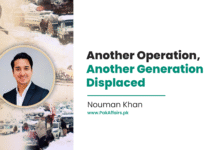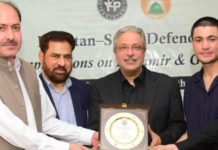Our justice system’s imperfections are thinly veiled; not always guilty get convicted, sometimes innocents are also sent to jail because of so many reasons. In Pakistan, imprisoning someone entails stripping him of all his basic human rights and forcing him to live in inhumane conditions in prison, with no hope of ever becoming a different person. Indeed, it is believed that Pakistan’s prisons are primarily instructional institutions for criminals rather than places where criminality can be deterred. Pakistan inherited its prison system from the British as a colonial legacy. The system was used as a tool to suppress political opponents and neutralize threats to the Crown. The first prison reform program in Pakistan was introduced in 1950 under the leadership of Col. Salamat Ullah, former IG Prisons (UP India). Later, various reforms were proposed and formulated at the provincial and federal levels. However, no significant work has been done to alleviate the plight of the prisoners. Unfortunately, we never take prison reforms seriously as a society or as individuals because we believe that prisoners are inhuman and do not deserve any rights. However, we have forgotten that every human being, including a prisoner, does have certain inalienable rights. We now need to take this matter seriously and implement positive reforms in our prisons because when these prisoners are released, they would not constitute a threat to society. Pakistan’s prison population is growing, and its prison capacity is staggering. Almost every prison has 30-40% overcrowding. It is a responsibility imposed BARRISTER DANISH R KHAN on the state by our constitution to take care of the welfare of prisoners after they are sent to jail. The following are some of the biggest challenges that Pakistan’s prisons face: Prison overcrowding is a serious issue that leads to a slew of other issues. Overcrowding is caused primarily by prisoners on trial. According to reports, prisons are so overcrowded that inmates sleep in shifts. In Pakistan, we have one judge for every 60,000 people, so it is not possible to deliver timely justice. According to the Law and Justice Commission of Pakistan, over 1.7 million cases are still pending. Overcrowding causes prisoners to suffer from illnesses that are rarely treated due to a lack of proper medical care. Poor hygienic condition of the cells is also a major source of infectious diseases’ e.g., Prison toilets do not have adequate water supply, in certain cells only utensils are kept attending to natural calls. In several prison cells, toilets are not available at night so most of them are flooded at night. These unhealthy conditions lead prisoners to infectious diseases and are exacerbated by a lack of medical care. In jails, torture is a regular practice. Not only do police torture prisoners, but some hard-core criminals also torture prisoners who are convicted in trivial cases. Torture is a problem that primarily affects non-hardened and habitual criminals who are unable to obtain bail due to high legal fees or who are unable to bribe prison officials. Torture of the prisoners is also a result of corruption. When the authorities receive money from the prisoners or their relatives, they are given protection and access to all facilities. The quality and amount of food offered in prisons has a significant impact on prisoners’ health. For prisoners’ health to be maintained and improved, they must have access to safe and nutritious meals. Prisoners are more likely to develop chronic ailments as a result of low food quality. Furthermore, prison food is typically poor and lacking in nutrition, which can negatively impact convicts’ physical and mental health, as well as their capacity to engage in and reintegrate into society after their release. In Pakistan’s prisons, there are about 1,300 juvenile criminals. Sixty percent are merely waiting for the trial to begin. The indefinite detention of undertrials is one of the most embarrassing elements of our judicial and legal systems. The majority of their offenses are small, such as attempted theft, burglary, forcible accomplice ship of convicted adults, and so on. Interactions with severe offenders on the same bus to the courts are one of the most serious challenges that minors encounter in prison. Smuggled drugs into prisons by corrupt officials are another challenge that makes the prisoners drug addict. In Pakistan’s prisons, female prisoners face harassment, insanitary conditions, and a lack of proper healthcare. Female prisoners constantly encounter sexual harassment and abuse from prison wardens, and they also report anxiety, sleep issues, and suicidal thoughts. Women who are pregnant do not have access to adequate facilities. There is no distinction between those who are awaiting trial and those who have been convicted. According to the United Nations Standard Minimum Rules for the Treatment of Prisoners, published in 1955, prisoners under trial must be kept separate from convicted prisoners. Due to the terrible conditions in Pakistan’s prisons, the idea of changing a prisoner’s criminal mindset through imprisonment would never be achieved. As I previously stated, our prisons function as universities where criminals are trained. Confinement in such prisons and simple hefty punishment will not discourage them from committing crimes again. We can change criminals’ thoughts and convert them into better citizens for society by providing them with adequate fundamental facilities. Reducing the number of trials to a bare minimum can help to relieve prison overcrowding and, if convicted, send the accused to prison. Open jails can solve the problem of overcrowding as well as reform and rehabilitation of prisoners. Our neighbor India has started the open jails concept in Rajasthan for prisoners’ welfare and rehabilitation. They do not constitute a threat to society, according to the study, they continue working after their punishment is over. Denmark is another excellent example of an open prison. In Denmark, prisoners prepare their own meals, dress, and meet with their families once a week. However, the eligibility and mechanism of open prisons must be developed so that convicted criminals must have served one-third of their total sentence and must demonstrate good behavior in prison before being transferred to an open prison and hardened and habitual criminals will be denied access to such facilities. The two most basic needs of prisoners are proper medical treatment and nutritious food, which our prison manual also promises, but sadly, it is only in the prison manual and has never been implemented. Food authorities must be ordered to monitor food quality in prisons and to take strict legal action against prison officials if they find any negligence. Prisons must provide adequate medical care and maintain an online medical record of each prisoner, enabling their families to access their medical treatment history and share it with the relevant ministry once a month. Women’s prisons must be separated, and their administration must be handed over to female officers only. Undertrial and convicted prisoners must be separated from each other and make sure they have no direct contact with convicted prisoners. In order to access and treat prisoners with mental illnesses, we must ensure psychiatrist sessions with them. There must be a proper department of psychiatrists so they can keep providing their services to the prisoners and help them change their mindset. Prisoners also deserve a second chance to change themselves and the rights promised by our constitution must also be provided to them.
PRISONS REFORMS
Advertisement




